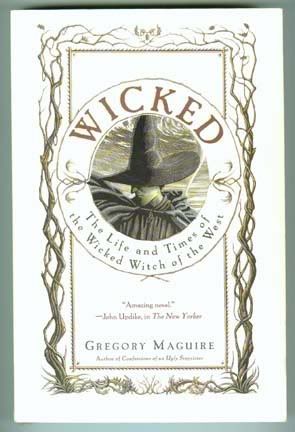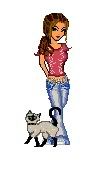Author: Gregory Maguire
Reviewed by Florinn Johannsen

Originally published in 1995 by HarperCollins, Maguire's Wicked is experiencing a reawakening following its modification and release for theatre in 2003. The benefit of being late to review this novel is that outside of the initial hype, one is able to create a less-influenced opinion of Maguire's work. It also creates a spectrum for level of agreement with the prevailing themes in other interpretations of the book. The most common is whether Maguire was able to adequately resolve his premise: evil defined.
The book is a view into the inner sociological and political atmosphere of Oz under the Wizard's rule. Portrayed as a place of civil unrest and political manuevers ranging from the Powerful's manipulation of traditional rituals to outright Fascism and oppression of societal groups. The characters are archtypal and static. Frex, a clergyman desperately fighting an influx of neopaganism is reminiscient of Kingsolver's Nathan Price in both his zeal and his cluelessness. Melena is a superficial and immature woman whose marriage to Frex was an ill conceived attempt at rebellion. An heiress to the title Eminent Thropp, her choice to marry down has rendered her a lonely hermit in a village that enjoys her only in gossiping about her. Their first child, Elphaba, destined to later become the Wicked Witch of the West was conceived, born, and baptized under dubious circumstances and her life continues to be a struggle. She is not only awkward, ugly, and possesses an uncannily sharp set of teeth, but her skin is also a bright shade of green. Her personality is dark and introverted even as a child, (her first word was "horrors!") and she is deathly allergic to water. Melena and Frex don't care for her and have as little to do with her as possible. Any attention Elphaba does receive from Melena is limited to emotional abuse and blame for her mother's failings. The small measure of affection she does receive is from her abrasive nursemaid Nanny and a transient named Turtle Heart who moves in and ensues separate romantic relationships with both Melena and Frex.
Galinda, later known as Glinda the Witch of the North is placed as Elphaba's roommate at college and there is a clear archtypical difference between the two. Elphaba is dark, serious, and studious. Glinda is preoccupied with clothing, her social standing, and attractive men. Elphaba's sister Nessarose, (or half sister as the case may be,) is witty but handicapped. Her physical inadequacies contribute to an overdeveloped sense of self and a warped morality. She is given the infamous ruby slippers as a gift from Frex and Elphaba's hurt at being overlooked again is intense. Nessarose's shoes become a symbol of her control and oppression of the Munchkinlander people she rules over as the succeeding Emminent Thropp.
Infuriated by the injustices around her, and irritated by naivete of the general citizenship of Oz, Elphaba disappears to sympathize with an activist group and eventually becomes part of a cell that employs violent means targeted at political revision. The oppression and atrocities she has aligned herself against are backed by the Wizard and the resistance is terminated by Gestapo-like military force. Elphaba's character has a gradiose social empathy that doesn't quite compensate for her deficits in interpersonal expression. Her relationships are strained or even ignored in favor of animals and her political quest to right injustice.
An old schoolmate and handsome Vinkan prince named Fiyero becomes Elphaba's lover. His purpose in the book appears to serve as a window to the soft part of Elphaba's heart, the man who is able to see her not as a terrorist but as a person with a sense of justice and humanity that is warped only by the society she is surrounded with.
Finally, a travelling pagan Dwarf and an old woman called Yackle appear in various scenes of the book, acting as an oracle and typically presenting their predictions and advice through charged and deviant sexual symbols. A frequent source of negative reviews of Wicked is the extreme use of sexual metaphors, some even claiming Maguires use of kinky sex was a ploy to sell a book and its premise through eroticism. This being the case to me seems unlikely, the sexual content serves as a wake up call to the characters and the readers given that that Fiyero's illicit affair with Elphaba while his wife and harem sit at home in the country is hardly shocking in light of our sexually charged society. Perhaps Maguire felt the other scenes were a necessary albeit extreme way to get his point across. An interesting contrast to the charged sexual content of the book is the fact that Maguire's main character refuses to acknowledge her own sexuality fully, never expressing complete confidence or comfort with her lover, never acknowledging her pregnancy or son's birth--coincidentally the same aspects our society refuses to acknowledge as sexual.
Whether or not Maguire is able to adequately define what evil is, he certainly achieves defining what it isn't, which in the case of the book isn't Elphaba, the Wizard, or even Dorothy who ultimately is Elphaba's demise. Elphaba's personal quest in the second half of the book is one searching for forgiveness. The Wizard's self loathing is his motivation to oppress others and his downfall. Dorothy is from start to finish self centered, unaffected, and refuses to participate with or develop unkindness in her own character. What is most remarkable is that none of the characters in the story experience development in their personality toward change, rather their original characteristics are honed by their circumstances. Elphaba becomes more misunderstood, darker, and depressed as the story goes on. Glinda becomes more oblivious and superficial, Fiyero becomes more appealing and understanding, and even Yackle becomes more mysterious and unreachable, and simultaneously more influential.
Underneath the shroud of guilt, struggle, and depression Elphaba lived her life with, the underlying question for her is whether she is a volitive being in her own life, or whether she is controlled by unseen forces: Madame Morrible her school marm, the Wizard, or the mysterious Yackle who tends to be present at the key moments in her life. Her insistence on independence and stubborn refusal to change her purpose or methods (she appears to be the only character in the book with a psychological awareness that includes metacognition) often seem to be the one thing that is holding her back, ultimately she is her own oppressive force.
Although the plot of Wicked is weak, (which may be a given as we already knew the ending) the character study and interaction were the most clearly defined subjects and the overriding theme was a question not about evil, but about locus of control. The repetitive questions about the definition of evil fueled this theme and propelled the story forward. Sociological structures and political statements become a means of describing the premise rather than premises in and of themselves. Maguire's ability to flip character expectations succeeds in making a Wicked Witch endearing.
